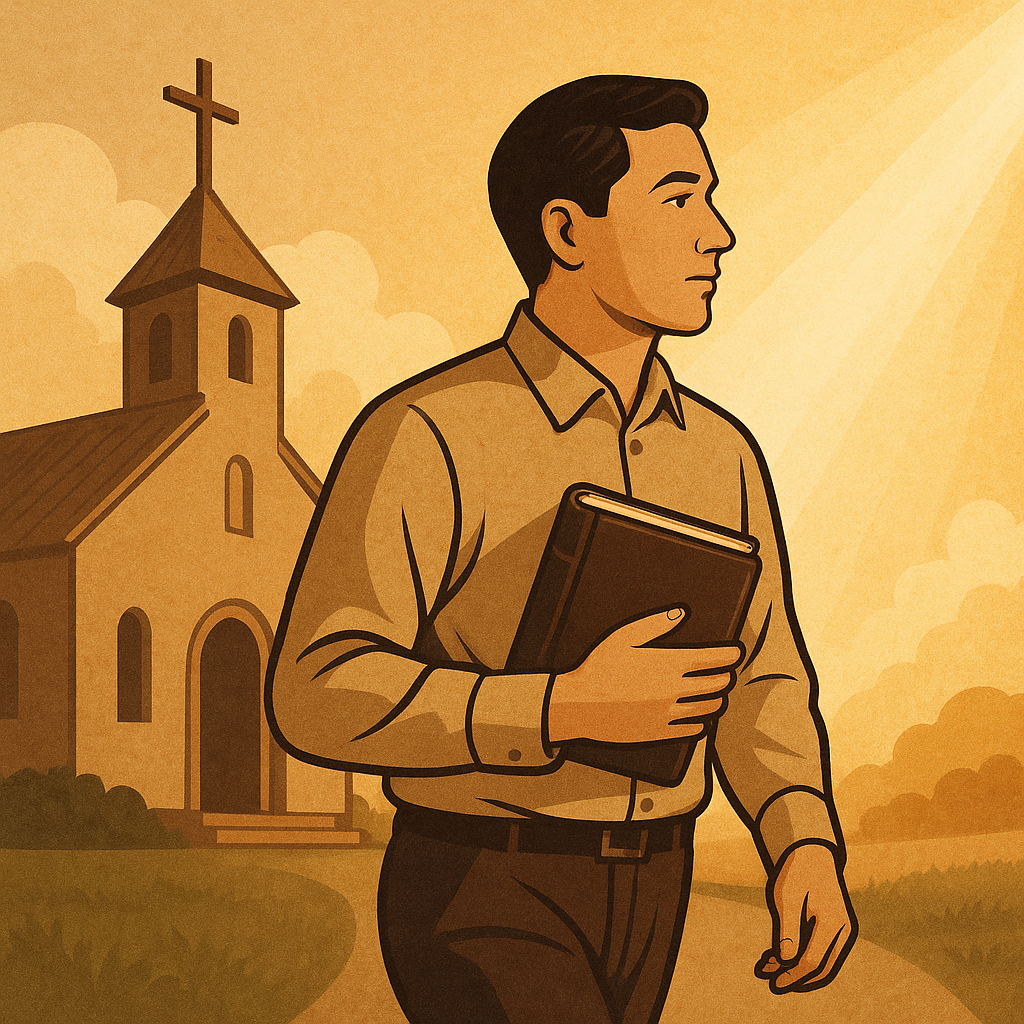文 / Husir.
曾几何时,我以为“教会”就是那栋坐落街角、有十字架、有讲台、每周人来人往的建筑。每逢主日,我也习惯性地去“那地方”,敬拜、听道、唱诗、奉献——这一切我曾以为就是“信仰生活”的全部。
但今天,读了一篇关于教会本质的文章,我的认识被深深触动了。我忽然意识到,多年来自己虽然“在教会”,却未必“在基督身体里”。
原来,教会,不是建筑,不是制度,不是某个宗派,不是某位牧者的个人魅力平台——教会是人,是那群被耶稣基督亲自呼召出来,因着信而重生、被圣灵联合在基督里的活人。
教会不是地上的组织,是属天的身体
新约圣经中,“教会”(ἐκκλησία)一词从不用于指代建筑。它的原意是“被呼召出来的一群人”。耶稣第一次提到“教会”时说:
“我要把我的教会建造在这磐石上,阴间的权柄不能胜过它。”(太16:18)
这里的“磐石”不是指彼得这个人,而是指他所认出的那位——耶稣基督,永生神的儿子。换句话说,教会不是建立在人或机构上,而是建立在基督之上,唯有祂才是教会的根基与元首(西1:18)。
保罗也清楚地指出:
“我们不拘是犹太人,是希腊人,是为奴的,是自主的,都从一位圣灵受洗,成了一个身体。”(林前12:13)
这个身体就是普世性的教会——跨越国度、时代、文化,由圣灵重生的信徒所组成的基督身体。
地方教会是真教会的地上表达
圣经中也常提到“众教会”,比如“加拉太的众教会”“哥林多教会”等。这说明除了属天的合一身体,还有真实的地上聚会。这些地方教会是信徒在具体城市、村镇、家庭中聚集,彼此交通、敬拜、建造的属灵群体。
然而,地方教会并不等于组织化的“机构”。它的本质依然是生命的联合,而不是权力结构的建立。若某些地方教会渐渐将讲台变成了个人舞台,将团契变成了排他圈层,将牧职变成了权力象征,那么它就正在偏离基督的教会本质。
教会不是用来扩张权势、聚拢资源、营造品牌的工具,而是神呼召出来的一群“悔改的人”。管理部门从来不怕一个个的聚会点敬拜、查考圣经等行为,他们担心的是这些聚会信徒人人都有悔改的心,愿意放下彼此成见和其他聚会点的信徒组成信念一致的悔改群体,并组成越来越壮大的信众群体。这样的群体才是属于耶稣基督的属灵共同体。
我意识到:不能偏左,也不能偏右
今天这篇文章让我深深明白一件事:在认识教会的过程中,不能偏左也不能偏右。
偏左,是走入律法主义与制度迷信。把建筑、职称、组织当作属灵的凭据,用守规条代替属灵生命;把“参加聚会”“参与服侍”变成一种自我安慰,却忽略了生命的真实悔改和活出真理。
偏右,是陷入放纵与属灵个体主义。高举“我与神直接连通”,却拒绝属灵群体的建造与顺服;说是“自由”,实则远离了身体的连结与权柄的遮盖,最终走向任意而为、自我中心的道路。
真正的路是——走在基督为我们开出的中道上。
一方面,我需要警醒制度化教会可能产生的属灵冷漠与形式主义,脱离社会现实单讲信仰;另一方面,我也必须警惕脱离群体的自义和孤岛式信仰,对教会弟兄姐妹的属灵疾苦视而不见。
教会的本质:不是让人舒服,是引导人归向基督
教会存在的意义,不单是为了给人“归属感”,而是为了将人带向基督。保罗写信给提摩太时这样形容教会:
“教会是真理的柱石和根基。”(提前3:15)
如果一个地方教会不能成为真理的支柱,只会讲祝福、不谈罪恶,只会迎合人心、不传悔改,只重形式、不重生命,那么它只是在复制世界的系统,而不是见证基督的国度。
真正的教会,会带着爱讲悔改的道,会扶持人悔改而不是掩盖罪,会鼓励圣洁而不是纵容妥协,会提醒人背起十字架,而不是卖出廉价的恩典。
我该如何回应?
今天,我不再将教会视为一个“我去”的地方,而是一个“我属于”的属灵身体。
我愿意:
- 先检视自己:是否真在基督里?是否愿意被主光照、修剪、更新?
- 然后寻找一群同样被主呼召、渴望真理的弟兄姊妹,一起聚集,不论在线上还是线下,只要有主在其中,就是教会的样式。
- 若我已经在地方教会中,就不只是“参与”,而是成为那个共同建造的人,不沉睡、不随流、不偏左、不偏右。

结语:愿我成为主教会里真实的一块石头
教会是基督的身体,我不愿只做一个“旁观的观众”,也不愿成为一个“冷漠的制度执行者”。我愿做一个真实的肢体,关注社会现象背后的属灵愿意,与基督连结,与弟兄姊妹彼此建造。
哪怕世界愈发喧嚣,哪怕有假教会混乱真理,我仍愿在祂话语中分辨,在祂恩典中站立,在祂身体中扎根。
正如彼得所说:
“你们来到主面前,也就像活石,被建造成灵宫,作圣洁的祭司。”(彼前2:5)
愿我这块活石,归属基督,连接身体,永不偏离。
——
写于一次对“教会”的重新认识之后。
Rediscovering the Church on the Rock
By Husir
Once, I thought “church” meant the building on the corner with a cross, a pulpit, and crowds every Sunday. Week after week I went there to worship, listen, sing, give—convinced that was the whole of “Christian life.”
Today, after reading an article on the essence of the church, I was shaken. I realized that for years I had been “in a church” yet not necessarily “in Christ’s body.”
The church is not a building, system, denomination, or a pastor’s personal stage. The church is people—those whom Jesus Christ personally calls, who are reborn by faith and united in Him through the Holy Spirit.
The Church Is a Heavenly Body, Not an Earthly Organization
In the New Testament, ekklēsia never means a building. It literally refers to “a called-out assembly.” The Lord first used the word when He said:
“And I also say to you that you are Peter, and on this rock I will build My church, and the gates of Hades shall not prevail against it.” (Matthew 16:18, NKJV)
Here, “this rock” is not Peter himself but the One he confessed—Jesus Christ, the Son of the living God. Thus the church rests on Christ alone; He is its only foundation and head (see Colossians 1:18 NKJV).
Paul declares:
“For by one Spirit we were all baptized into one body—whether Jews or Greeks, whether slaves or free—and have all been made to drink into one Spirit.” (1 Corinthians 12:13, NKJV)
That “body” is the universal church—believers from every nation, age, and culture reborn by the Spirit and joined to Christ.
The Local Church: Earthly Expression of the True Church
Scripture also speaks of the “churches of Galatia,” the “church of Corinth,” and so on, showing that alongside the heavenly body there are concrete gatherings on earth. These local churches are believers meeting in cities, villages, homes—fellow-shipping, worshiping, and building one another up.
A local church is not the same as a merely institutional organization. Its essence is life-union, not power structures. When a pulpit becomes a personal stage, fellowship a closed circle, or office a badge of control, it drifts from Christ’s design. The church is not a tool to expand power, hoard resources, or build brands, but a community of repentant people called by God.
Authorities seldom fear small study groups or hymn-singing; they fear gatherings where every believer repents, lays down prejudices, unites with other gatherings, and grows into a powerful body under Christ.
Neither to the Left nor to the Right
This lesson taught me that understanding the church must avoid both extremes.
- To the left lies legalism and institutionalism: treating buildings, titles, and rules as spiritual credentials, attending services or serving merely to soothe the conscience, while neglecting true repentance and obedience.
- To the right lies licentious individualism: exalting “my direct link to God” while rejecting community discipline; calling it “freedom,” yet drifting into self-centeredness without the body’s covering.
The true path is the narrow way Christ opened. I must beware the cold formalism of over-systematized churches, yet also guard against isolated self-righteous faith that ignores the needs of brothers and sisters.
The Church’s Purpose: Leading People to Christ, Not Comfort
Paul reminded Timothy:
“…the house of God… is the church of the living God, the pillar and ground of the truth.” (1 Timothy 3:15, NKJV)
If a local church cannot uphold truth—only promising blessings, never confronting sin, pleasing people without preaching repentance—then it merely copies the world and fails to testify to Christ’s kingdom.
A true church lovingly preaches repentance, supports repentance instead of covering sin, encourages holiness rather than compromise, and calls believers to carry the cross instead of selling cheap grace.
How Should I Respond?
I no longer see church as a place I go but a body I belong to. I will:
- Examine myself first: Am I truly in Christ, willing to be exposed, pruned, renewed?
- Seek brothers and sisters likewise called and hungry for truth; whether online or in person, if Christ is present, that is church.
- If already in a local fellowship, not merely “attend” but help build—stay awake, resist drift, avoid both left and right extremes.

Conclusion: May I Be a Living Stone in the Lord’s Church
The church is Christ’s body. I refuse to be a passive spectator or a cold institutional functionary. I long to be a genuine member, discerning the spiritual realities behind social issues, linked to Christ, building up one another.
Though the world grows louder, and false churches confuse the truth, I choose to discern by His word, stand by His grace, and root myself in His body.
“…you also, as living stones, are being built up a spiritual house, a holy priesthood, to offer up spiritual sacrifices acceptable to God through Jesus Christ.” (1 Peter 2:5, NKJV)
May I, a living stone, belong to Christ, connect to His body, and never drift away.
—Written after a fresh encounter with the meaning of “church.”

发表回复